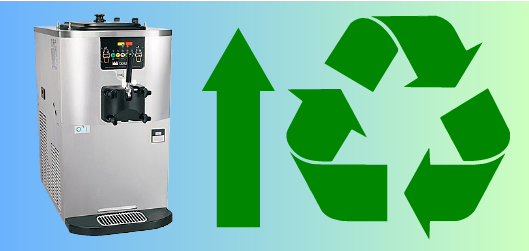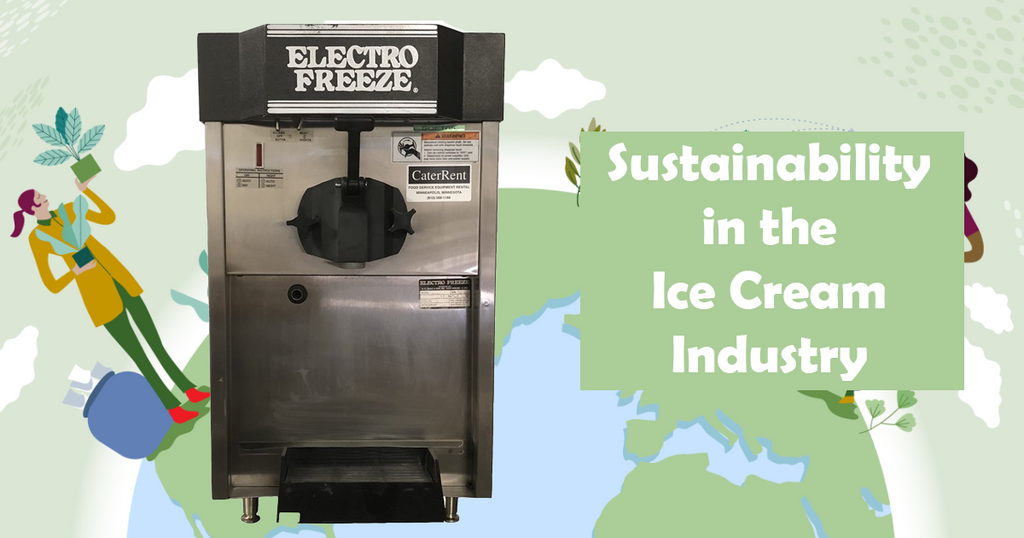TurnKeyInfo
Sustainability in the Ice Cream Industry
The ice cream industry, facing the rising tide of consumer demand for Eco-friendly practices, has been adapting to more sustainable models. As of 2023, this transformation is being reflected across various facets of the industry. Companies are now exploring innovative packaging solutions that minimize waste and reduce the industry's carbon footprint. For instance, the utilization of fibrous residues from sugarcane, a key ingredient for sweetness in ice cream, is being turned into biodegradable packaging materials. Moreover, around two-thirds of ice cream makers have already adopted or are planning to incorporate more sustainable packaging solutions. These efforts go hand in hand with other sustainable practices such as the reduction of greenhouse gas emissions through the transition to green refrigerants and better insulation in freezers. Additionally, embracing renewable resources, whether in packaging or in the operation of eco-friendly ice cream machines, signifies the industry's growing commitment to environmental stewardship. The introduction of more plant-based ingredients and the production of vegan ice cream are other noteworthy trends fostering sustainability. This shift not only responds to the global urgency to adopt environmentally friendly practices but also caters to the evolving preferences of consumers who are increasingly opting for greener, healthier choices.
Through these strides, the ice cream industry is not only enhancing its sustainability profile but is also paving the way for a more eco-conscious consumer experience. The collaborative effort among stakeholders, from manufacturers to consumers, is gradually molding a more sustainable and eco-friendly ice cream industry.
Sustainable Practices in the Ice Cream Industry

Next, I want to touch on all the different aspects of the industry that are collectively a net positive for the environment and follow eco-friendly practices.
Sustainable Supply Chain and Agriculture
The journey towards sustainability begins right from the cultivation of ingredients. Data-driven agriculture, facilitated by intelligent automation and real-time data analysis, is enabling farmers to optimize field conditions, manage plant care, and reduce water and fertilizer use, which in turn lowers the carbon footprint associated with ice cream production
Packaging Innovations
Packaging is a significant concern when it comes to the ice cream industry's environmental impact. Companies are now exploring sustainable packaging solutions, with some turning the fibrous residue from sugarcane (a key ingredient for sweetness in ice cream) into biodegradable packaging materials. Moreover, around two-thirds of ice cream makers have already adopted or are planning to incorporate more sustainable packaging solutions
Green Refrigeration and Energy Efficiency
Shifts towards green refrigerants and better insulation in ice cream freezers are part of broader efforts to reduce emissions and energy consumption. This transition not only supports the industry's sustainability goals but also aligns with global initiatives to combat climate change
Corporate Sustainability Initiatives
Major players in the ice cream market are setting ambitious sustainability targets. For instance, Unilever has outlined plans to achieve net-zero emissions across its value chain by 2039, and zero emissions within its own operations by 2030
Consumer-driven Sustainability
The push towards sustainability is significantly driven by consumer preferences. A study highlighted that 81% of global consumers find it crucial for companies to implement environmental programs, reflecting a strong market incentive for sustainability in the ice cream industry
Market Growth and Sustainability
The global ice cream market, projected to reach around $121 billion by 2028, is seeing a substantial increase in demand for sustainably produced ice creams with added nutritional value. This market growth is coinciding with an industry-wide shift towards more eco-friendly practices
The Rise of Eco-Friendly Packaging Innovations: A Global Shift Towards Sustainability
The growing wave of eco-friendly packaging innovations highlights a worldwide move towards sustainability. This change is fueled by environmental concerns, consumer demand, and regulatory pressures. Here's an in-depth analysis of the situation:
Prevalence of Traditional Packaging
The conventional 'take, make, dispose' model chiefly governs the packaging sector. For instance, only 14% of plastic packaging is recycled worldwide, with 40% ending up in landfills and a third finding its way into fragile ecosystems like oceans.
Below is a quick list of eco-friendly serving cups that can be used to serve your soft serve sustainbly.
Eco Gelato Cups from GS Gelato:
These cups are made of bioplastic derived from corn, making them a more ecological choice compared to traditional plastic cups. They are advertised as 100% biodegradable and compostable.
Greenchain Eco-friendly Clear Cold Cups:
These are listed under top eco-friendly cups on the Ecomasteryproject website, indicating they might be suitable for cold servings like soft serve.
Bare Paper Compostable Cups from Walmart:
They are available in various sizes (8, 10, and 12 oz), are PLA lined, fully compostable, and made from 100% plant-based renewable resources.
Yes!Fresh Biodegradable Cups:
Available on Amazon, these cups come in different sizes (4, 8, 12, and 16 oz) and are 100% biodegradable.
Various Biodegradable Cups from EcoFriendlySupplies:
The website EcoFriendlySupplies offers a range of biodegradable cups among other eco-friendly restaurant supplies. They focus on providing high-quality products at competitive prices.
Consumer Demand for Sustainability
Today's consumers, becoming more eco-conscious, prefer brands that adhere to environmentally friendly practices. Thus, sustainable packaging becomes a crucial factor for business success.
Innovative Solutions
Innovations such as edible films are emerging as sustainable packaging solutions, especially for food products. The global market for edible films is expected to hit $4.2 billion by 2028, showcasing its potential to alleviate food, packaging waste, and chemical leaching from plastics.
Economic Implications
The packaging sector represents a whopping $1 trillion in global annual spending. A move towards sustainability in this sector underscores full recyclability, reduced plastic usage, and innovative packaging solutions. Around 60% of sustainability pledges focus on enhancing recyclability and integrating a higher degree of recycled content, 26% on reducing plastic usage, and 14% on innovating and promoting change in packaging usage.
Corporate Commitments
75% of companies have committed to sustainable packaging, although the readiness to meet these commitments falls below 30%. Notably, consumer goods companies demonstrate a higher inclination (80%) towards sustainable packaging compared to B2B and industrial companies (66%).
Educational Initiatives
An important aspect of promoting eco-friendly packaging is educating consumers on the advantages of sustainable packaging and proper disposal methods. An informed consumer base is more likely to choose products with eco-friendly packaging, signaling a positive effect on market demand for sustainable packaging solutions.
Regulatory Developments
Regions like Europe are leading the charge in regulations regarding single-use packaging and extended producer responsibility on consumer-facing products. These regulations are gradually being adopted in the Asia-Pacific and North America, mirroring a global trend towards sustainable packaging.
Eco-friendly packaging innovations represent not only an ethical and environmental obligation but also a commercially viable route that caters to evolving consumer preferences and adheres to regulatory mandates.
These advancements demonstrate the ice cream industry's commitment to aligning with broader sustainability goals, responding to consumer demands for environmentally responsible practices, and contributing to global efforts to mitigate climate change. Incorporating sustainability into the realm of soft serve machines and ice cream production is a multifaceted endeavor that touches upon eco-friendliness of machines, sustainable industry practices, the use of used equipment, waste reduction, and green choices in production. Here's a concise breakdown of your outlined points:
Options for Eco-friendly Soft Serve Operations:
Eco-friendly Ice Cream Machines:
- The N2-G4 ice cream maker operates using liquid nitrogen which is an abundant and automatically recyclable resource, making it an eco-friendly choice.
- Teknoice offers eco-friendly continuous freezers under their Teknofreeze CO2 range
- Some businesses opt for electric ice cream trucks and use renewable products like bamboo spoons and sugarcane cups to minimize environmental impact
Sustainability in the Ice Cream Industry:
- The global ice cream market, valued at $113.8 billion in 2021, plays a significant role in environmental sustainability with initiatives targeting reduced emissions and sustainable packaging.
- Unilever, a major player, is taking steps to reduce emissions to zero within their operations by 2030 and across their value chain by 2039.
Benefits of Used Equipment:
In an era where sustainability and environmental responsibility are at the forefront of business operations, opting for used soft serve machines can be a commendable step toward reducing waste. New manufacturing processes invariably consume raw materials and energy, contributing to a larger carbon footprint. By choosing to invest in a high-quality used machine, businesses not only cut down on these manufacturing impacts but also prevent the unnecessary discarding of a fully functional appliance, thereby minimizing waste sent to landfills.
Furthermore, it's worth noting that acquiring a used machine doesn't mean compromising on performance or hygiene. Most used soft serve machines undergo rigorous refurbishing processes that include thorough cleaning, part replacement, and functionality checks. This ensures that they meet, or even exceed, the performance benchmarks set by new machines, all the while contributing to a more sustainable and environmentally-friendly business model. With the right maintenance, these machines can serve your needs just as efficiently as a brand-new unit, making them a smart choice for businesses looking to make an eco-friendly move.
- Used soft serve machines, when reconditioned, can come with full warranties providing a cost-effective and reliable solution for small businesses
- Buying used equipment is an economical choice allowing businesses to enhance production while managing budget constraints
Reducing Waste with Used Machines:
- Product recovery systems in ice cream plants can significantly reduce waste, saving both resources and money.
- Waste reduction in the ice cream filling business can be achieved by selecting machines that offer high uptime, minimized giveaways, and a high level of flexibility.
Green Choices in Ice Cream Production:
- Transitioning to green refrigerants and improving insulation in freezers are steps towards reducing greenhouse gas emissions.
- Sustainable palm oil production, as advocated by the Roundtable on Sustainable Palm Oil, provides a more environmentally friendly ingredient choice for ice cream production.
- The use of plant-based ingredients like pea protein or inulin, and the production of vegan ice cream are emerging as green choices within the ice cream industry.







